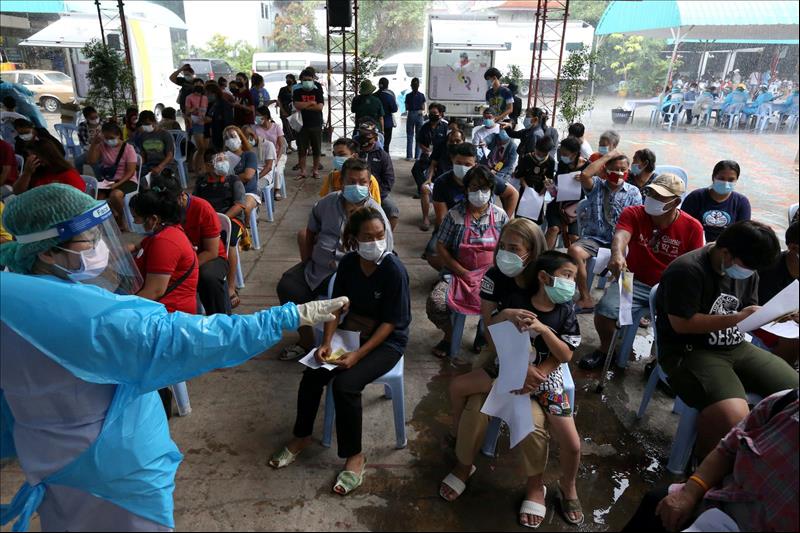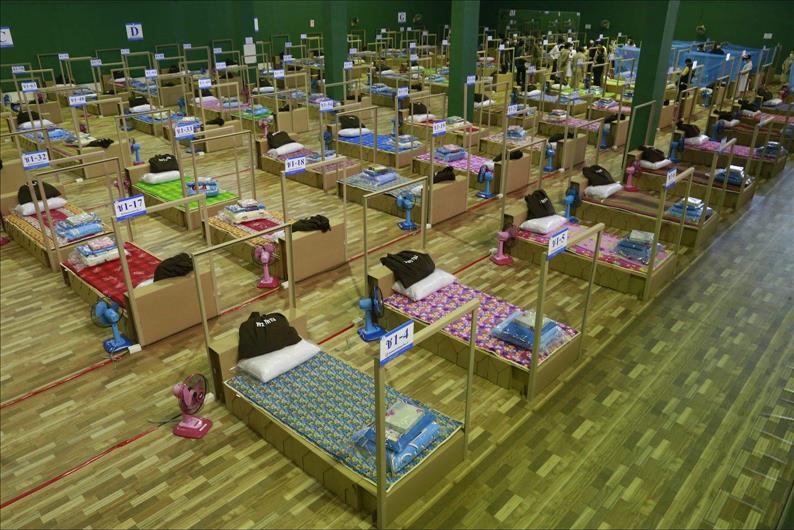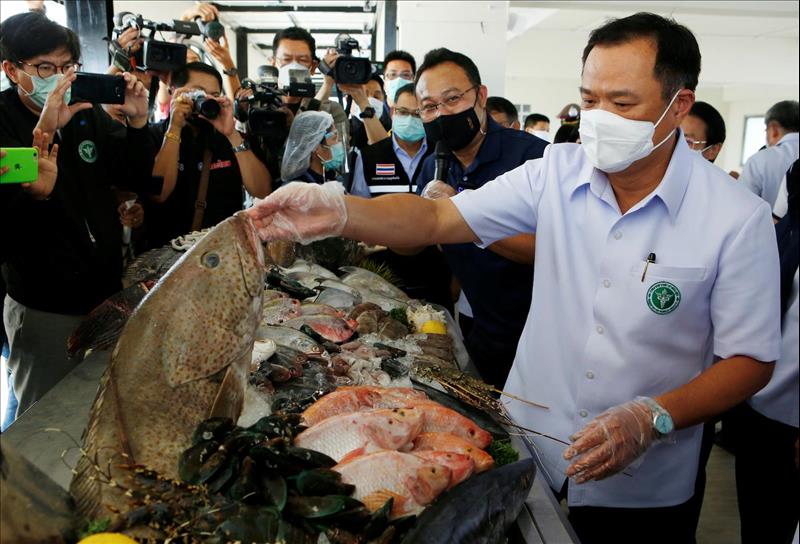(MENAFN- Asia Times) BANGKOK – When World Health Organization chief Tedros Adanom Ghebreyesus commended Thailand for its exemplary Covid-19 response at the global health agency's assembly last November, Bangkok sought to leverage the plaudit for self-promotional purposes.
The Thai Ministry of Public Health contracted a team of experts to help tell the kingdom's containment success story via a multi-media promotional campaign, a public relations blitz that was shelved when a new cluster of cases erupted among migrant workers in December.
Fast forward to the present, Thailand is now more of a cautionary tale of pandemic era risks of laxity, poor governance and even corruption, all of which have contributed to a record spike in new daily cases that Thai authorities are wholly failing to stem or contain.
Thailand recorded 4,887 new cases on Thursday, nearly double the kingdom's previous single-day record. The statistical surge came from over 2,835 cases detected in two cramped Bangkok prisons, which apparently until now had not bothered to test inmates for the disease.
Thailand's billowing third wave started in the first week of April after a cluster was detected at high-end bars in Bangkok's Ekkamai entertainment district, including a gentleman's club where a member of the Chirativat family that owns the kingdom's Central Group retail chain was reportedly among the super-spreaders.
A government source familiar with contact tracing and genome test findings says the strain originated from Cambodia and was likely imported by the elite business family member, who reportedly frequented Cambodia's casino district and was allowed by police to re-enter Thailand without serving mandatory 14-day quarantine.

A health official explains the registration procedure for a Covid-19 test as infections surged in Bangkok's Klong Toey slum community. Photo: AFP/Wichan Charoenkiatpakul/Bangkok Post
That's brought the kingdom's underlying rich versus poor narrative to the political fore as clusters erupt in Bangkok slums, low-income communities and now prisons. The storyline could heat up in the weeks ahead as the poor bear the brunt of the fast-spreading outbreak and the scramble for limited Covid-19 vaccines intensifies.
The health crisis is rife with political intrigue. Prime Minister Prayut Chan-ocha's government decided against locking down over the mid-April Buddhist New Year, the kingdom's top annual celebration where Thais travel en masse to their provincial homes or tourist destinations. The celebration was locked down in 2020 and sources say officials feared a potential backlash if Bangkokians were forced to cancel their travel plans.
That decision came over the advice of medical experts who warned that without a lockdown Thailand risked a high wave of new cases, a prognosis that a month later has come crashing down. Thailand had less than 100 total Covid-19 deaths before the Buddhist New Year; the figure has since surged to over 518.
In an apparent break from centrally controlled messaging, the government's Department of Disease Control warned on April 12 the kingdom could see 28,678 daily cases without ''decisive'' measures.
Authorities have recently implemented partial lockdown measures including school, bar and restaurant closures, but daily case numbers have remained steady at between 1,500-2,000 until Thursday's extraordinary surge of 4,800 plus. Thailand has recorded a total of 93,794 cases since the pandemic began.
The real daily figure could be much higher as Thais eschew tests that could force them into state field hospitals that critics say resemble ''Covid detention centers'' if found positive. News reports suggest hospitals were already near their ICU and bed capacity before today's reported surge in cases.

Rows of beds fill Chaloem Phrakiat Sports Training Centre in Thung Kru district of Thailand's Bangkok where officials are running final checks on the field hospital run by Erawan Hospital 3 before it is opened. Photo: Bangkok Post via AFP/Arnun Chonmahatrakool
Experts and analysts say Thailand clearly let its guard down after its earlier WHO recognized containment success, born of an early hard lockdown that restricted travel during last year's Buddhist New Year, widespread compliance with mask-wearing and social distancing, and strict border controls including mandatory state-run, 14-day quarantine for new arrivals.
Those hard measures broke down over time, particularly along the kingdom's porous, police-controlled borders. Prayut's government is under heavy political and business pressure to reopen the country to tourism, an industry that contributes as much as 20% of gross domestic product (GDP) during high times but has been especially battered by the pandemic.
Some financial analysts worry that non-performing hotels and resorts, many recently built to accommodate what then seemed like an endless wave of Chinese tourists, could start to infect the wider financial system as local banks absorb the brunt of the leveraged industry's collapse.
But it's not necessarily a health versus economy debate. While many Thais have supported the government's bid to leave the economy at least partly open after last year's -6.4% GDP contraction, its laggard vaccination drive – among the slowest in Asia and trailing even lesser developed neighbors – has sparked sharp criticism over social media and political potshots from the opposition.
Siam Bioscience, a pharmaceutical company partly owned by King Maha Vajiralongkorn's Crown Property Bureau, is at the heart of the controversy. The firm won a competitive bid to produce AstraZeneca's vaccine for distribution in Thailand and regionally, but for unclear reasons has not yet produced or distributed any shots.
Health experts note Siam Bioscience has no previous experience in vaccine production, unlike the Government Pharmaceutical Organization, which has collaborated with the US and WHO to produce other vaccines but for unknown reasons was overlooked by the Oxford University-affiliated AstraZeneca.

Thai Public Health Minister Anutin Charnvirakul checks out fish and other seafood on display at Samut Sakhon Hospital on Dec 27, 2020. There has been something fishy in his ministry's Covid-19 response. Photo: Bangkok Post via AFP/Apichit Jinakul
Experts and analysts say Health Minister Anutin Charnvirakul, a loyal royalist with self-advertised personal ties to the monarch, may have earlier sought to position the royally affiliated Siam Bioscience as a ''national savior'' as the kingdom's only source of vaccines.
That, the same sources say, may have also contributed to the Health Ministry's failure — or perhaps fear — to secure batches of other vaccines, an apparent policy-level decision that in hindsight looks badly flawed amid global concerns about AstraZeneca's efficacy and safety, with evidence the shot causes rare blood clots.
That protectionist narrative has also been bolstered by what many experts see as the Thai Food and Drug Administration's chelonian movement in approving other by now widely accepted if not superior Western-made vaccines, namely Pfizer-BioNTech and Moderna.
Significantly, Thai regulators quickly approved China's Sinovac vaccine, even though the WHO is still assessing the shot's efficacy and safety. The shot is now slowly being administered to frontline health workers and government officials, but isolated reports have emerged that certain Thai elites are jumping the queue.
It's not clear yet that shifting political perceptions about the Prayut government's handling of the escalating health crisis, which previously was seen as technocratically handled by medical professionals rather than non-expert politicians, will be enough to bring down his wobbly coalition.

A medical staff member administers a vaccine outside of an indoor football stadium in Bangkok on May 11, 2021. Photo: AFP/Lillian Suwamrumpha
But cracks are showing. Prayut recently seized firmer control of his government's Covid response, effectively sidelining the ambitious Anutin for a second time during the pandemic. While Prayut's intervention last year handed crisis control to medical technocrats, it's not as clear the ex-army commander is taking all their advice this time.
Critics say that was clear in a rambling nationally televised speech Prayut delivered in mid-April when the Covid crisis was first mounting and in which the ex-soldier came off as especially elliptical and badly mispronounced the names of vaccines – a gaffe widely lampooned over social media.
Anutin has long had his eye on the premiership, political insiders and analysts say, and his second-ranking Bhumjaithai party's withdrawal from the coalition would inevitably lead to new elections, arguably at a time when the kingdom can ill-afford what would amount to yet another elite-driven, super-spreader event.
MENAFN13052021000159011032ID1102076240